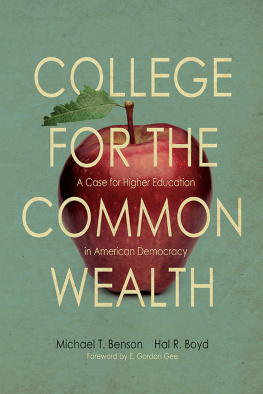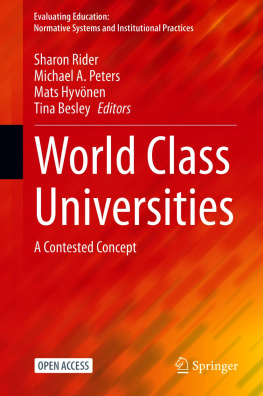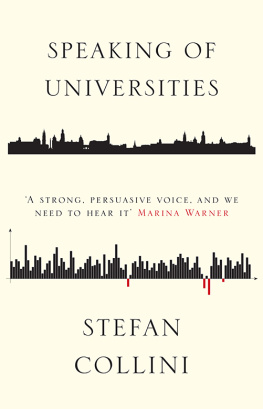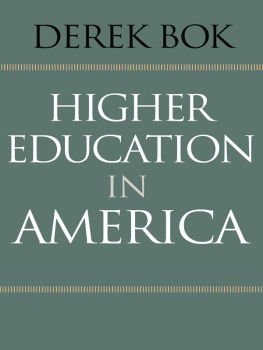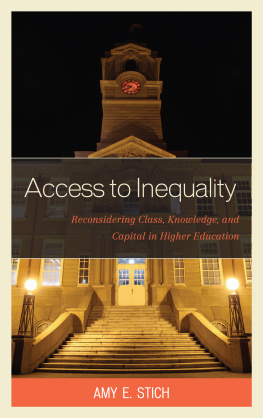Higher Education and the Common Good
Higher Education and the Common Good
Simon Marginson

MELBOURNE UNIVERSITY PUBLISHING
An imprint of Melbourne University Publishing Limited
Level 1, 715 Swanston St, Carlton, Victoria 3053, Australia
www.mup.com.au
First published 2016
Text Simon Marginson, 2016
Design and typography Melbourne University Publishing Limited, 2016
This book is copyright. Apart from any use permitted under the Copyright Act 1968 and subsequent amendments, no part may be reproduced, stored in a retrieval system or transmitted by any means or process whatsoever without the prior written permission of the publishers.
Every attempt has been made to locate the copyright holders for material quoted in this book. Any person or organisation that may have been overlooked or misattributed may contact the publisher.
Text design by Phil Campbell
Cover design by Phil Campbell
Typeset by J&M Typesetting
Printed in Australia by OPUS Group
National Library of Australia Cataloguing-in-Publication entry
Title: Higher education and the common good / Simon Marginson.
ISBN: 9780522871111 (hardback)
ISBN: 9780522871098 (paperback)
ISBN: 9780522871104 (ebook)
Notes: Includes bibliographical references and index.
Subjects: Education, HigherAustralia.
Universities and collegesGraduate work.
Common good.
Creator: Marginson, Simon, author.
Contents
Figures
Tables
Preface
It was a happy experience to work on Higher Education and the Common Good as the chapters rolled out, with the final three written on the stone in the last week of July 2016. Writing any serious book carries with it the pangs and pleasures of creativity, as the adrenalin dips and rises. As one San Francisco band put it: Sometimes the lights all shining on me Other times I can barely see. The writing was also a good experience for more specific reasons. The argument in this book is one that needs to be made. Working on the book has been an opportunity to open a larger space for thinking about the public contributions of higher education. As in previous work, I have been compelled by the questionable foundations, gaps and internal tensions in the standard thinking about higher education and its social and economic roles. The survival of human capital theory this long as the dominant idea about relations between individuals, higher education and paid work is really quite remarkable, given that many factors other than education contribute to earnings. The faith that the installation of competitive markets in higher education will lead to better quality and greater responsiveness to the needs of students would be touching in its naivety if it was not also so destructive. The inability of economics to adjust for the particular character of social production in the higher education sector, and in the education sector more generally, continues to do much damage.
Working on the book reminded me of the need for a wider ranging and integrated account of higher education, which might be called a theorisation of higher education. This is something that has not been attempted since Burton R. Clarks Higher Education System (1983).
The book was also affected by its immediate conditions of production. First, the final manuscript was touched by current events. It was prepared in London in the immediate aftermath of the 23 June 2016 referendum decision to take the United Kingdom out of the European Union (Brexit) on a vote of 52/48. Higher education institutions are among the most European of British social sectors, and the decision to leave the EU threatened to undo part of the web of relationships in which they make some of their best and most important contributions to the world. Voting behaviour showed a strong correlation between being university educated and wanting to retain the cosmopolitan connection to Europe; and correspondingly, not being university educated and wanting to leave the EU. It was not unlike the electoral polarisation generated in the Donald Trump presidential campaign in 2016 in the United States: the split between on one hand educated cosmopolitan modernists in the professional economy, and on the other hand those whose identity was grounded less in education, career and mobility and more in locality, kinship and a visceral and nostalgic patriotic identity (Give us back our country! in the UK; Make American great again! in the United States). There was evidence during the United Kingdom referendum of rejection of the views of experts, particularly in communities that had suffered the sharp end of government austerity policies, and that the universities and the European Union had become lumped together with the City of London and other beneficiaries of growing income inequality in the country. In the high capitalist United Kingdom, higher education was paying the price for both its long association with elite formation and the recent emphasis on the private economic benefits of degrees (salaries, employability), within a financing regime where tuition charges are exceptionally high by world standards, without regard to the broader public and collective benefits of the sector.
Higher Education and the Common Good is one response to that negative positioning of higher education, and a celebration of the potentials offered by the multiple engagement of higher education in society, within a cosmopolitan social democratic framework. In the context of present Anglo-American debates (which have parallels in France and elsewhere), empty posturing about the contribution of universities to local, national and global public goods no longer has much cut through, if it ever did. Nevertheless, real observable activity of higher education institutions, co-produced by the community and unaccompanied by boosterism from university marketing, makes a tangible difference. The book also draws the conclusion that unless Anglo-American higher education policy, and higher education institutions themselves, begin to diminish the universities own effects in social inequalityeffects that show in the growing investment in private educational goods, the hyper-competition and the sharp stratification of value that goes with it, the almost aristocratic concentration of the power at the topthen higher education will not only fail to fulfil its potential for the common good but also remain vulnerable to isolation and popular resentment. Anglo-American higher education is not the driver of the political economy of growing inequality in fractured societies but, with its relational and intellectual capabilities, and its broad institutional architecture of participation, potentially higher education offers one part of the solution. It does not have to be stratifying, and hence dividing. It can also be inclusive, combinational, ameliorative and healing. Along with other changes in politics and society, a democratised higher education sector can do much to build more equal and generous societies. This will happen only if higher education is allowed to do so, and it chooses to do so. Neither is guaranteed, and each is possible. There is much scope for agency (and contingency) in public and political matters.
Second, my personal circumstances shaped the book. Despite the dislocations and questions evoked by personal mobility, the never quite settled strangeness of removing on a long-term basis from ones roots, I am also fortunate in London. I am deeply grateful to my wife Anna Smolentseva. Thank you also Ana Rosa and Sasha, not only for our shared life but also for letting me work hard for a few days while the book was being finished. It is good to communicate about these matters with my father Ray Marginson in Melbourne because we share similar convictions and he understands the issues here. Likewise, collaborative thinking and work with Brendan Cantwell, Ken Kempner, Rajani Naidoo, Imanol Ordorika, Brian Pusser and Jussi Valimaa have been important. The book was partly shaped by High-participation systems of higher education, a cross-country project started by Anna in Moscow in 2013, which is leading to another book that we are all looking forward to. My current writing has been much informed by the participants in that project: Dominik Antonowicz, Brendan Cantwell, Isak Froumin, David Konstantinovsky, Marek Kwiek, Glen Jones, Reetta Mohenon, Romulo Pinheiro, Anna Smolentseva, Jussi Valimaa and Aki Yonezawa.
Next page

